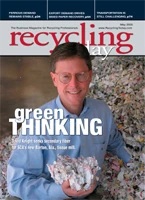MICHIGAN DEQ OUTLINES SOLID WASTE STRATEGY
Testifying before the Michigan Senate Natural Resources Committee, Department of Environmental Quality (DEQ) Director Steven E. Chester has outlined a comprehensive solid waste strategy designed to improve Michigan’s recycling programs and to ensure that landfill capacities remain adequate.
"Michigan citizens pay for waste disposal in a multitude of ways, including bearing the burdens of living near landfills and coping with truck traffic and noise, and it is time for that subsidy to end," Chester says. "We must work together to end the free use of Michigan as a dumping ground for out of state waste."
The DEQ has released a series of solid waste reports that emphasize the need for a comprehensive solid waste strategy to be enacted in Michigan that addresses reducing waste generation, diverting materials from disposal, ensuring appropriate disposal capacity and applying safeguards to protect public health and the environment when disposal does occur.
Chester says the cornerstone of a responsible solid waste management policy for Michigan must include:
•
Funding efforts to increase recycling, provide for economic development and build technical capacity at the local level.•
Expanding the Bottle Bill to control litter and reduce the amount of recyclable material going to landfills.•
Ensuring disposal capacity for waste generated in Michigan while reducing excess capacity attractive to out of state waste generators.•
Doubling the amount of waste recycled in Michigan by providing recycling opportunities for all Michigan citizens through plans designed and implemented at the local level.•
Updating the original 1988 "Michigan Solid Waste Policy" to support these goals.Reports on Michigan’s recycling and solid waste management efforts are available on the DEQ’s Web site at www.michigan.gov/deqwaste.
GRAND JURY INDICTS FORMER MAYOR
A federal grand jury has returned a superseding indictment focusing on Albert Robles, former South Gate, Calif., mayor and treasurer, that implicates his associate in a plan to obtain millions from a waste hauler seeking a contract with the city.
The 42-count indictment alleges that Robles used his influence as a city official to extort money and other benefits for himself and his family, friends and political action committee Citizens for Good Government. The indictment also alleges that the citizens of South Gate were defrauded out of their right to Robles’s "honest services" in a plan that cost the city at least $12 million and led to payments of more than $1.4 million to Robles, his family and his friends. In a second incident, Robles allegedly steered a waste hauling contract to a company in exchange for gifts, campaign contributions and a consulting contract for his friend.
This case against Robles is the result of an investigation by the Federal Bureau of Investigation and IRS-Criminal Investigation Division.
Additional information on the investigation is available on www.RecyclingToday.com.
SEATTLE RESTRICTS DISPOSAL OF RECYCLABLES
Seattle began prohibiting the disposal of paper and corrugated containers, aluminum and bi-metal cans and bottles from commercial waste streams at the start of this year in an effort to reach a recycling goal of 60 percent. The city has also expanded its yard waste disposal ban to include commercially generated material as well as residentially generated material.
The city is implementing the ordinance in phases. Now, those disposing significant volumes of recyclables in their trash cans will receive educational material. Beginning in 2006, repeat offenders may be fined and experience collection delays.
To increase the level of recycling, Seattle will introduce several new recycling services, including commercial food scrap collection; more frequent collection of yard waste; the addition of vegetable waste to yard waste; recycling containers in public places; and free curbside recycling for businesses.
In late March, Seattle added 96-gallon, wheeled carts to collect yard waste, vegetative food waste and food-solid paper.
"Nearly 40 percent of Seattle’s residential garbage is made up of organic waste," Mayor Greg Nickels says.
The city will distribute 90,000 yard waste carts neighborhood by neighborhood through June.

Explore the May 2005 Issue
Check out more from this issue and find your next story to read.
Latest from Recycling Today
- Nucor receives West Virginia funding assist
- Ferrous market ends 2024 in familiar rut
- Aqua Metals secures $1.5M loan, reports operational strides
- AF&PA urges veto of NY bill
- Aluminum Association includes recycling among 2025 policy priorities
- AISI applauds waterways spending bill
- Lux Research questions hydrogen’s transportation role
- Sonoco selling thermoformed, flexible packaging business to Toppan for $1.8B





